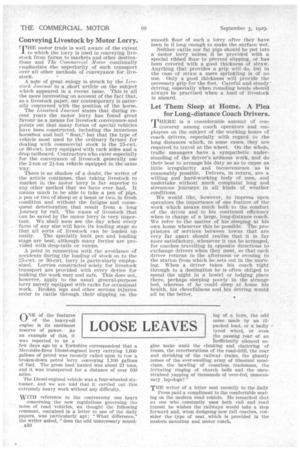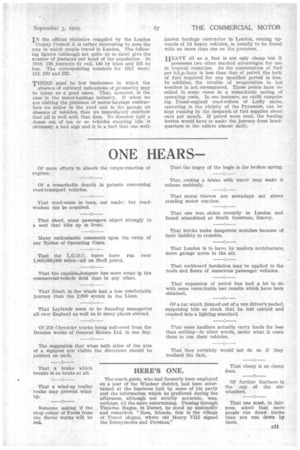LOOSE LEAVES
Page 44

Page 45

If you've noticed an error in this article please click here to report it so we can fix it.
ONE of the features of the heavy-oil engine is its enormous reserve of power. As an example of this, it was reported to 'us a
few days ago by a Yorksh're correspondent that a Mercedes-Benz Diesel-engined lorry carrying 1,600 gallons of petrol was recen ly called upon to tow a broken-down petrol lorry conveying 1,100 gallons of fuel. The gross load hauled was about 21 tons, and it was transported for a distance of over 100 miles.
The Diesel-engined vehicle was a four-wheeled sixtonner, and we are told that it carried out this extremely heavy work without any difficulty.
WITH reference to the controversy one bears concerning the new regulations governing the noise of road vehicles, we thought the following comment, contained in a letter to one of the daily papers, was particularly apt: "What difference," the writer asked, "does the odd unnecessary sounds10 mg of a horn, the odd noise made by an illpacked load, or a badly tyred wheel, or even the passing roar of an Thefficiently silenced engine make amid the clanking and clattering of trams, the reverberations of the road-drill, the roar and shrieking of the railway trains, the ghastly noises of the ever-swelling army of itinerant musicians, the bawling of countless tradesmen, the irritating ringing of church bells and the unrestrained yapping of thousands of over-fed, unnecessary lap-dogs?"
THE writer of a letter sent recently to the daily
Press paid a compliment to the comfortable seating on the modern road vehicle. He remarked Ufa t as one who constantly uses both rail and road transit he wishes the railways would take a step forward and, when designing new rail coaches, consider the -type of seat which is provided in the modern motorbus and motor coach, IN the official statistics compiled by the London County Council it is rather interesting to note the way in which 'people travel in London. The following figures (although not quite up to date) give the number of journeys per head of the population. in 1918, 138 journeys by rail, 146 by tram and 101 by bus. The corresponding numbers for 1927 were 113, 130 and 233.
THERE mustbe few businesses in which the absence of outward indications of prosperity may be taken as a good omen. That, however, is the case in the motor-haulage industry. If when we are visiting the premises of motor-haulage contractors we notice in the yard and in the garage an absence of vehicles, then we immediately cc:include that all is well with that firm. To discover half a dozen out of ten or so vehicles standing idle is obviously a bad sign and it is a fact that one well known haulage contractor in London, owning upwards of 24 heavy vehicles, is usually to be found with no more than one on the premises.
HEAVY oil as a fuel is not only cheap but it possesses two other marked advantages for use in tropical countries. As the consumption of fuel per b.h.p.-hour is less than that of petrol, the bulk of fuel required for any specified period is fess. In addition, the trouble of evaporation in. hot weather is not• encountered. These points have resulted in some: cases in a remarkable saving of operating costs. In one instance, an outfit ccimprising Diesel-engined road-rollers of Laffiy make, operating in the vicinity of the Pyramids, can be kept running by the despatch of fuel supplies about once per month. If 'petrol were used, the feeding lorries would have to make the journey from headquarters to the rollers almost daily.




















































































































